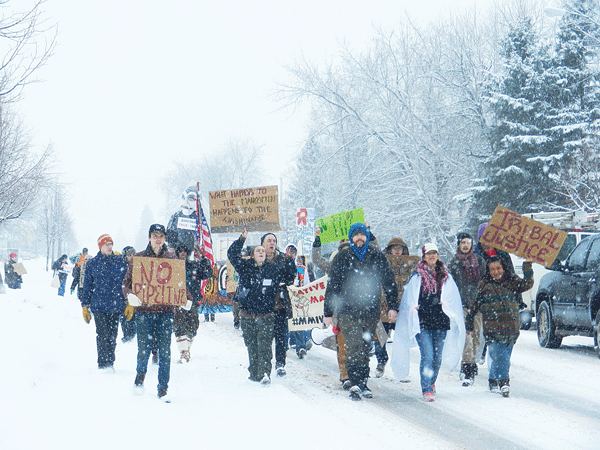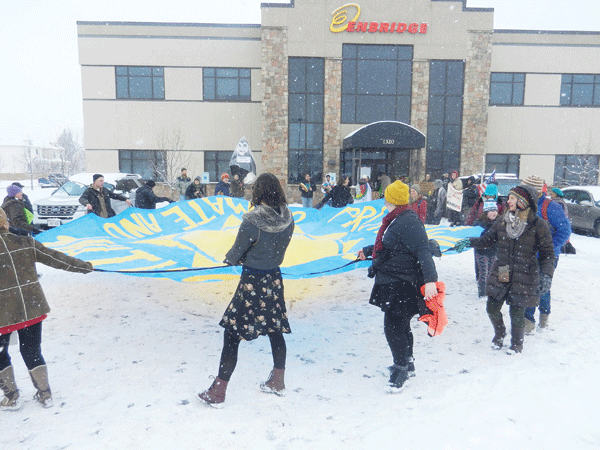News & Articles
Browse all content by date.
 It was a snowy day at Noon on Monday, January 25 as a group of approximately 100 protesters gathered in front of the Douglas County Courthouse in Superior to speak out against proposed Enbridge Energy pipelines. This rally and protest against Enbridge and the pipelines is an ongoing confrontation by the protesters to be heard by the company. On November 2, 2015 some of the same members entered the Enbridge offices in Duluth’s Tech Village and asked that Enbridge employees accept a letter of demands. The letter was refused and seven were arrested for trespassing by Duluth Police because they would not leave unless the letter was accepted.
It was a snowy day at Noon on Monday, January 25 as a group of approximately 100 protesters gathered in front of the Douglas County Courthouse in Superior to speak out against proposed Enbridge Energy pipelines. This rally and protest against Enbridge and the pipelines is an ongoing confrontation by the protesters to be heard by the company. On November 2, 2015 some of the same members entered the Enbridge offices in Duluth’s Tech Village and asked that Enbridge employees accept a letter of demands. The letter was refused and seven were arrested for trespassing by Duluth Police because they would not leave unless the letter was accepted.
This time the group wanted to speak to a representative of Enbridge to set up a time and place to have a debate. Again, Enbridge has refused to address the protesters and their invitation and has stood behind law enforcement in silence.
The courthouse was just the first rally point for the group that consisted of members of Honor the Earth, Native American tribes, and concerned citizens. After a short while, the group walked less than a block across Hammond Avenue and arrived on the steps of the Enbridge offices located at 1409 Hammond Avenue. The office doors were locked and there was already a police officer inside the building’s entrance when the group arrived. An officer on the outside of the building advised the protesters to not block the door although it was likely no one would be entering or exiting while they were around. Members of the group such as Korey Northrup with Honor the Earth spoke through a megaphone intermittently between Native American drumming and singing. After a number of minutes being rallied in front of the Hammond office without any answer, the group dispersed and started heading east along a residential street behind the courthouse.
The ultimate destination was to be the Enbridge office located at the 1300 block of Grand Avenue. We walked about half a block ahead of the march and when we arrived we observed two police officers enter the office building and close the door. The protesters showed up a few minutes later, but it was already apparent that there wasn’t going to be any more back and forth in communication than at the first office.
Local activist, Kym Young, was one of a handful to speak through a megaphone in front of the Grand office. “The police are paid to protect the money, to protect the higher-ups, to protect the corporations, not to protect the citizens. They’re here to force the laws on us and keep us down, to force the laws that are allowing our water to be poisoned,” said Young. It should be noted that the Enbridge offices are private property and the officers have little choice than to keep the public out even though Enbridge won’t agree to an arranged public debate and has made themselves inaccessible as far as the public is concerned aside from maybe a press release or being the ones to run the Public Utilities Commission meetings, which usually have several members of local law enforcement standing guard.
 The group stayed in front of the office for over half an hour chanting, singing and dancing around a parachute. Chants such as, “for debate set a date!” marked the group’s intentions of showing up. Other than an officer observing the protest from across the street in a squad car and the locked-in Enbridge workers, there was no one present aside from the protesters and media.
The group stayed in front of the office for over half an hour chanting, singing and dancing around a parachute. Chants such as, “for debate set a date!” marked the group’s intentions of showing up. Other than an officer observing the protest from across the street in a squad car and the locked-in Enbridge workers, there was no one present aside from the protesters and media.
The group eventually left and marched back to the courthouse. Thane Maxwell, an organizer for Honor the Earth, was one of the last to make a speech. “Just because we’re not getting validation in the media and validation through public policy doesn’t mean that there’s not a number of laws being violated. The court ruled in favor of First Nations and set the process back several years on the Northern Gateway pipeline. That took grass roots efforts and $600,000 to support First Nations in their legal work. If anyone is going to stop these pipelines it’s going to be the tribes and the treaty authority.”
After the rally ended we talked with Maxwell about how he felt about Enbridge’s lack of response to a request for a debate. “It’s like they don’t understand, but they do. Their response has been, ‘no, you’ve had ample opportunity to talk in the Public Utilities Commission hearings. We all know that that process is dysfunctional and that people don’t get a chance to be heard. Even in the ones that invite the public to talk, you’re lucky if you get three minutes. That’s not public input, that’s not public participation, and they say ‘we encourage dialog, we encourage active discussion about our projects,’ but they keep refusing,” said Maxwell.
After the day’s activities, Enbridge released a statement calling the protest of their projects as the views of a “vocal minority.” This seemed like an interesting thing to say because a year earlier we covered a Public Utilities Commission hearing concerning the Sandpiper pipeline at the Holiday Center Ballroom where hundreds attended and spoke from both sides in three to four minute intervals for hours. It is fair to say that the room was at least split down the middle. Many of those who were for the pipeline that day were paid representatives of industrial construction companies and unions that would benefit monetarily from working on the projects. Those against the pipeline seemed to not care about money at all but were interested in the preservation of the land and water where the pipelines cross. It seems like the company might be confusing a voice with money if that meeting could be used as an example.
The crux of the movement against the pipeline lies heavily on Native American tribes in the region which makes the “vocal minority” statement from Enbridge look insensitive to say the least as far as First Nations people are concerned. The reason some Native Americans feel strongly about the issue is that the pipelines run through treaty lands that were promised to them. It’s understandable that with Enbridge’s track record of oil leaks such as the Kalamazoo River in Michigan, where Enbridge has shelled out over $1.2 billion to clean up an oil spill of millions of gallons that spanned around 40 miles down the river, that Native Americans wouldn’t want pipelines crossing their lands. To quote Michael Dahl from the White Earth reservation who talked with us before last year’s PUC meeting, “The greatest thing people need to understand is that the treaties didn’t give us anything. We gave up our land but maintained the right to hunt and fish in those areas. Any changes with those lands were to be consulted with us…That’s the thing about our society today, it’s all about how the process is. The process today is do we need a pipeline? So, no we don’t, especially as indigenous people, no, we don’t need another pipeline running through our area.” Enbridge has no problem going through the formalities of working the system to their favor, hiding behind the police, and then dismissing anyone they deem as a “vocal minority,” even if that “minority” has legitimate legal, spiritual and ancestral reasons to have a voice. Enbridge’s desire to “consult” the “vocal minority” is non-existent as they’ve made very readily apparent.
Enbridge also claims in a statement towards those against the pipelines that “the information they offer is largely false.” It would seem that if that were the case, wouldn’t things be to Enbridge’s advantage to have a public debate and clear the air? If one can make the claim to be almost totally right, then there should be no problem in proving another party wrong in a public debate rather than just saying it in a press release. From all of the PUC meetings that we have attended, when it came to examples of Enbridge’s track record on spills from pipelines, they had little to say about it other than they are more safety conscious because of it. They can’t deny when their record is brought up because their own company has reports on the numerous spills that are available to the public. It is interesting that they can say that information that they themselves provide is “largely false.” Could that be downgraded to the information being mostly true from the “vocal minority” if the corporation itself has information that confirms what the “minority” is saying? It’s questions like these that arise when Enbridge has avoided discussions when even their own press releases contradict their own information that is being used against them. It almost looks like a public relations tactic to minimize what has been going on and hoping that people will just take their word for it. In that sense, it seems understandable that they would not want to have a debate that isn’t on their terms.
In November, seven people went to jail for trespassing because Enbridge refused to read a letter signed by representatives of five different organizations that have thousands of members in the area. The irony of the trespassing charges is that Native American tribe members argue that Enbridge is trespassing on them. The group that is now known as the “Duluth 7” will face a pre-trial conference on January 28 at the St. Louis County Courthouse at Noon. The demands towards Enbridge have so far been to read a letter (Nov. 2, 2015) or set up a time for a public debate (Jan. 25, 2016). Since Enbridge has indicated that they have all the support they need to do what they want, it is likely that they will continue to ignore, minimize, and hide from facing the “vocal minority” and this ordeal will continue indefinitely.
There is a follow-up story about the “Duluth 7” with Jesse Peterson on page 20.
| Tweet |

